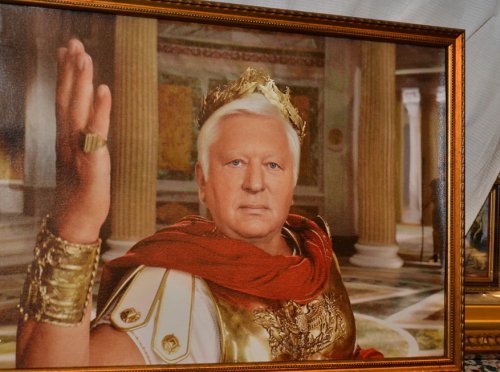Victor Pshonka as Caesar
Ukrainians have already begun to forget that the Donetsk mafia was not only a gangster, but also a prosecutor, and the latter turned out to be much worse. When a person comes under the influence of crime, he instinctively seeks protection and justice from the Law. But what to do when the law itself turns into a brush, and prosecutors and police officers into robbers, taking away business and property? In most cases, this pushes people to revolt, which happened in early 2014 – for which ex-Prosecutor General Viktor Pshonka bears perhaps the greatest responsibility.
Kramatorsk youth
Viktor Pavlovich Pshonka was born on February 6, 1954 in the village of Sergeevka, Slavyansky district, Stalin (Donetsk) region. What he did in his early years remains unknown; his biography only states that he graduated from high school and was drafted into the army in 1973. Why, a year late, at the age of 19, he never told the public. But then it’s more interesting: the demobilized young handsome man, having no special plans for life, followed in the footsteps of his older brother Nikolai (born 1947). And he went to Kramatorsk to get a job at a machine-building plant, where his brother once worked (by that time he was already studying at the Faculty of Law of the Kyiv State University named after T.G. Shevchenko).
In Kramatorsk, Viktor Pshonka literally immediately meets and starts an affair with a girl, Olga. Her maiden name is still hidden from everyone, since, as they said, she was from a difficult family with connections to the city committee of the CPSU. Through which (through the Komsomol line) she received a very prestigious job at that time in the Bureau of Trade Expertise of Kramatorsk. Their romance was very rapid, a few months later they got married, and Olga Nikolaevna took the surname Pshonka. However, the young spouse needed to be placed somewhere, and then Victor himself helped them, deciding to follow his older brother Nikol (born 1947) into law school. True, instead of Kyiv he was sent to study in Kharkov – so that he would not be so far from his young wife.
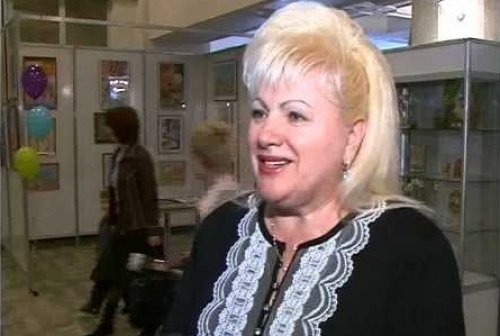
Olga Pshonka
While he was studying law in Kharkov, his son Artem was born in Kramatorsk in 1976, and his wife was rising up the career ladder, heading the Bureau of Trade Expertise. In 1980, Viktor Pshonka returned to Kramatorsk: he worked in the city prosecutor’s office as an intern, an investigator, and in 1982 he became a deputy city prosecutor. And in 1983, thanks to his wife’s relatives, he received the position of head of the administrative department of the Kramatorsk City Committee of the CPSU, where he worked for three years. Having received experience in party work, Viktor Pshonka returns to his native prosecutor’s office of Kramatorsk, sitting in the chair of its chief. In which he successfully survived “perestroika”, the collapse of the USSR and the first years of Ukraine’s independence, as well as the growth, flourishing and mutual extermination of the two largest Kramatorsk organized crime groups – the “Old Town” and the “Seventeenth”, to which, as they said, local authorities had a hand. After which there was only one “roof” left in the city – the police and the prosecutor. It was then that Victor Pshonka learned the wisdom that it is not necessary to create your own business if you can simply take away someone else’s.
In Donetsk
In 1997, Viktor Yanukovych, a protégé of the growing Donetsk group Akhmetov, became the new head of the Donetsk regional state administration.Kolesnikova. Then the entire regional government changed, during which the “Donetsk people” sought to place their people in the vacant seats, but Gennady Vasilyev continued to reign supreme in the Donetsk prosecutor’s office. The influence of this person is evidenced by the fact that the organized crime group of Alik Grek (Bragin), from which the leaders of the “Donetsk” later emerged, went under the “roof” of Vasilyev, and then Akhmetov also used his services. The result of the close cooperation of this tandem was the special status of the Donetsk prosecutor’s office: it was one of the very few government agencies that did not fall under the new all-powerful masters of the region, who monopolized all power in it. And this, in turn, influenced the future of Viktor Pshonka: although formally he is considered one of the “Donetsk”, in fact he was never a member of this clan. Pshonka never worked for Akhmetov (although he provided him with all sorts of services), he worked only for Yanukovych. And this, in turn, was used to his advantage by Yanukovych himself – as far as his ingenuity allowed him.
But why did Vasilyev invite Pshonka as his deputy, and why in 1998, having received the mandate of a people’s deputy and left for Kyiv, did he hand over his position to him? After all, Vasiliev had much more suitable candidates for this from prosecutors – for example, Rafael and Rinat Kuzmin (Read more about them in the article Renat Kuzmin: family business of lawless prosecutors), with whom he developed a vigorous activity in Donetsk (Agroprominvest LLC, Holy Mary Company, Pokrovsky market, taking away business from a number of Donetsk entrepreneurs). They said that Pshonka again owed his promotion to his wife Olga, who by that time already headed the Donetsk Chamber of Commerce and Industry and was well acquainted with the entire Donetsk elite: businessmen, officials, security officials, and leaders of organized crime groups. They said that Olga Nikolaevna, who has become a very strong-willed and influential lady, is greatly respected by Rinat Akhmetov himself. And again, the rapprochement between Pshonka and Yanukovych was helped by the friendship of their wives Olga and Lyudmila, who were often seen together at performances in the Donetsk theater.
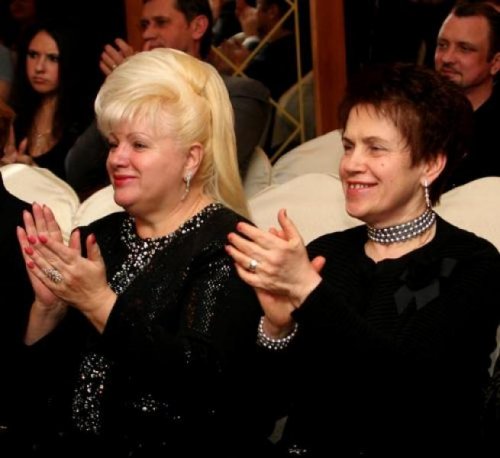
Olga Pshonka and Lyudmila Yanukovych
Two publicly publicized stories eloquently tell why during Viktor Pshonka’s work in the Donetsk prosecutor’s office (1997-2003) virtually no incriminating materials were preserved about him. The first is a typical example of the monster that Gennady Vasilyev and then Viktor Pshonka turned the Donetsk prosecutor’s office into. In 2001, an incident occurred in one of the cafes in Donetsk: a drunk investigator from the prosecutor’s office decided to “go wild” right next to the bar, and when the establishment’s employees tried to take him to the toilet, he caused a pogrom in the hall. After the owner of the cafe, at his own expense, wrote a complaint against the hooligan to the regional prosecutor’s office, his life turned into a complete nightmare: checks and fines rained down on him, a number of criminal cases were opened against him, eventually being thrown into the wind and leading to disability. But, one might say, he got off easy!
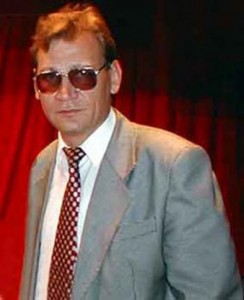
Igor Alexandrov
Much sadder was the fate of the Slavic journalist Igor Alexandrov, who headed the regional television company TOR. Back in 1998-2000. The prosecutor’s office conducted a criminal case against him under the article “slander” for publications about the region’s vodka business, which affected the interests of the prosecutor’s office “protecting” this business. Deciding to strike back at the prosecutor’s office with his own weapon, that is, new revelations in the media, Aleksandrov prepared a series of programs about corruption in the regional leadership, and in particular about regional prosecutor Viktor Pshonka and his son Artem. Who by that time had grown up and followed in his father’s footsteps in every sense of the word: he graduated from law school, became a deputy prosecutor of Kramatorsk and a participant in many corruption scandals. They began to openly threaten the journalist – his colleagues later noted that in the last days before his death, Aleksandrov was in a very depressed state. And on July 3, 2001, a couple of days before the next program, the main “hero” of which was supposed to be Artem Pshonka, Alexandrov was killed, beaten to death on the steps of his own television company.
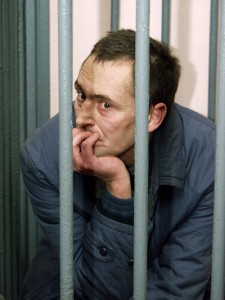 The investigation of this high-profile murder turned into a farce, which brought Victor Pshonka fame throughout Ukraine. The prosecutor’s office presented Yuri Veredyuk, a homeless man dying of tuberculosis, as the only accused.
The investigation of this high-profile murder turned into a farce, which brought Victor Pshonka fame throughout Ukraine. The prosecutor’s office presented Yuri Veredyuk, a homeless man dying of tuberculosis, as the only accused.
Despite the indignation that arose in the press, Pshonka personally demanded that the investigators “ignore the insinuations in the press” and bring the matter to the end with this accused. And the case went to trial, at which Veredyuk was found not guilty. Which, however, only led to new tragedies: a month later Veredyuk suddenly died, followed by the deaths of two witnesses to the crime and the Slavic policeman Andrei Ryabtsev involved in the case – while the Donetsk prosecutor’s office refused to initiate criminal cases into their deaths.
Khlebny Kyiv
In December 2003, Leonid Kuchma fired Svyatoslav Piskun (Read more about him in the article by Svyatoslav Piskun. Scandalous and unsinkable) from the post of Prosecutor General. Later, he would be reinstated through the courts, but until the Maidan, the Prosecutor General’s Office was ruled for a whole year by Gennady Vasilyev – who immediately dragged Viktor Pshonka with him to Kyiv, making him his deputy. Together with Donetsk prosecutors, their traditional “business” also moved to Kyiv. When rumors spread throughout the capital that the “Donetsk” were squeezing out companies from entrepreneurs and demanding a share in profitable schemes, they did not always clarify that we were not talking about the oligarchic Akhmetov-Kolesnikov clan, but about the prosecutorial duo Vasilyev-Pshonka.
Arriving in the capital, Viktor Pshonka first of all took care of a roof over his head – and got himself a government-owned apartment at 45/49 Vladimirskaya Street, which he quickly privatized. In the summer of 2004, Pshonka again became involved in real estate: having previously initiated criminal cases against a number of officials of the Kyiv City State Administration, he obtained from them a “payoff” in the form of the allocation of 8 land plots on Ovrutskaya, Sretenskaya, Streletskaya and Turgenevskaya streets, which were transferred for mere pennies to long-term lease under development for the Yurkovitsa-Zhytlobud trust. According to the most conservative estimates, thanks to Pshonka’s “care” this trust saved about 6 million dollars!
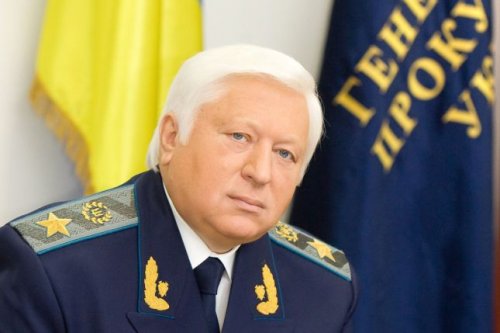
Victor Pshonka
During the short period of his first stay in the Prosecutor General’s Office, Viktor Pshonka managed to “become famous” for other scandals. So, in October 2004, the SBU discovered a grandiose scam, which was carried out by the Ukrsplav HALL, owned by a regional deputy Evgeny Geller – a person very close to Akhmetov. The essence of the scam was that the company, under the guise of expensive “pantographs,” exported cheap aluminum scrap, after which it was going to carry out the VAT refund procedure, “shoeing” the state for 150 million hryvnia. The SBU tracked down the ship “Wotan” with a cargo of fake “pantographs”, and was going to catch it red-handed – the matter was only subject to the sanction of the Prosecutor General’s Office. The paper lay on the table of Viktor Pshonka, who read it thoroughly and immediately jumped out of his seat. A few hours later, border guards from the Mariupol detachment blocked the path of the SBU operatives and allowed the “Wotan” to sail into the sea. Later, Pshonka stated that all the accusations against him in this case were a blatant “stalking” and a provocation of political enemies.
When people from Donetsk began to leave Kyiv en masse in December 2004, Viktor Pshonka also resigned, following Gennady Vasilev. After this, Vasiliev never returned to the Prosecutor General’s Office, but Pshonka did it twice: at the end of 2006, he became deputy Prosecutor General Alexander Medvedko (at the personal insistence of Viktor Yanukovych), holding this position until the 2007 elections, and then returned to this position. chair in June 2010. And finally, on November 4, 2010, by decree of President Yanukovych, Viktor Pshonka was appointed Prosecutor General of Ukraine. Why him and not Vasiliev? Firstly, Vasiliev received a rather negative image in the eyes of voters even before the first Maidan, when many revelations about the activities of the “Donetsk people” appeared. And secondly, Vasiliev was much more connected with Akhmetov and Kolesnikov than Pshonka, and Yanukovych wanted to have as Prosecutor General a person who, if anything, could act on his side against the Donetsk clan. After all, then Yanukovych began to create his own “family”.
“Shadow Prosecutor’s Office”
But Victor Pshonka preferred to rely on his real family, since no one sat idle in his house. Olga Nikolaevna Pshonka in 2002 gave up her position as president of the Donetsk Chamber of Commerce and Industry (CCI) to her reliable person Gennady Chizhikov, formally becoming his deputy, and in 2003 becoming vice-president of the Ukrainian Chamber of Commerce and Industry (CCI) – actually managing them. For the uninitiated, these are meaningless abbreviations, but businessmen are aware of the huge role they played in the recent past. Acting as an intermediary between business and the state, the Chamber of Commerce and Industry certifies force majeure, issued certificates of goods – including export ones, which made it possible to carry out scams with VAT refunds, carried out examinations of goods and real estate valuations, was engaged in bar coding and patent licensing, and worked with the International Commercial Arbitration court. In addition, Olga Pshonka’s plans were to transfer to the Chamber of Commerce and Industry the monopoly right to administer exams and issue licenses to public sector employees who are involved in public procurement – that is, in fact, she would issue these licenses only to her own people! It is probably not surprising that Olga Pshonka has not yet discovered her own large companies – the Chamber of Commerce and Industry brought her sufficient profit.
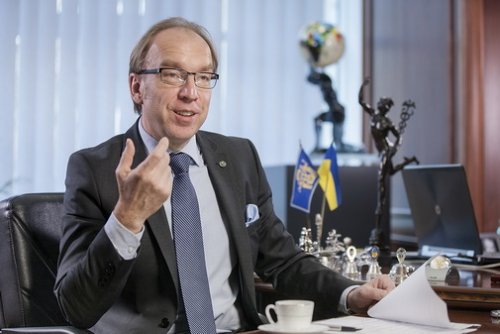
Gennady Chizhikov
The fact that the TPP eventually became Pshonka’s personal “office” is confirmed by the fact that it is still headed by Gennady Chizhikov, who became the president of the Ukrainian Chamber of Commerce and Industry in February 2013 (Olga Nikolaevna chose to become vice-president there too). As it turned out, the Chamber of Commerce and Industry is staffed entirely by Pshonka’s people, so there is simply no one to choose another president from, and it is impossible to appoint one – after all, it is a non-governmental organization. Meanwhile, Chizhikov, who is trying to repaint himself as a “European integrator,” actually blocked the work of the Chamber of Commerce and Industry. By the way, a similar situation is observed in her husband’s former department: the Ukrainian prosecutor’s office is still full of people from Vasilyev and Pshonka, who are bloodily sabotaging the fight against corruption.
By the way, it was not for nothing that the famous raider Alexander Duyuovoy tried to seize the Chamber of Commerce and Industry (Read more about him in the article by Alexander Dubovoy. Turchinov’s comrade and professional raider). It is now difficult to understand whether he gained control of the organization or not. But judging by some of the actions of the Chamber of Commerce and Industry, the leadership reached an agreement with the raider.
Meanwhile her son Artem Pshonkawho became a people’s deputy of Ukraine in 2007 (and then in 2012) (from the Party of Regions), also moved to Kyiv and mastered all the intricacies of his father’s “shadow business”. And he headed the so-called “shadow prosecutor’s office”, located in a building at 35 Olesya Gonchar Street (the property belongs to the daughter of Igor Surkis). According to unofficial evidence so far, the “shadow prosecutor’s office” played the role of a corruption center under the Prosecutor General’s Office, where Viktor Pshonka put his son to “keep order” and receive visitors. And “clients” of two categories went there. Some were in prosecutor’s uniform and brought in money: kickbacks, contributions to the common fund, payments for the purchase of positions, offerings for the removal from office of those whose positions they were counting on. The fees were substantial: from 50 thousand dollars for the position of an investigator in the district prosecutor’s office to 2 million for the position of a regional prosecutor. Other visitors wore expensive haute couture suits and paid to solve their problems with the law or to create such problems for their competitors. There, according to witnesses, the headquarters of raider takeovers carried out through the prosecutor’s office was located. There is information that cases of the gaming business, “protected” by the prosecutor’s office, were also decided there, and specifically in this business Artem Pshonka had a partnership with Gennady Kernes (Read more about him in the article by Gennady Kernes. Dark pages of the past of the Kharkov mayor). According to rumors, huge sums of cash and gold were stored in the office of the “shadow Prosecutor General’s Office”, and during the Euromaidan they were hastily carried out through the basements.
Comment: Only those who had enough money for it could “solve it through Pshonka.” At the same time, through Pshonka Jr., even those who were imprisoned for murder were pulled out of prison.
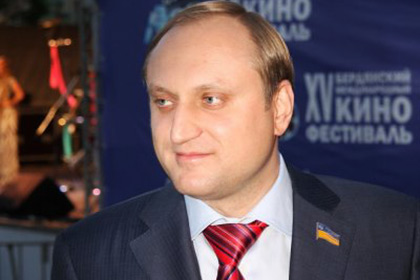
Artem Pshonka
However, Artem Pshonka was not only involved in the gaming business. In addition to the fact that he is the owner of a jewelry factory in Kramatorsk, Pshonka Jr. had close ties with the GazUkraine-2009 company, with which his mother Olga Pshonka may also be connected. This is a virtually unknown company. Registered in Simferopol, in 2011-2012 she suddenly became the winner of a tender worth about 3 billion hryvnia – and the Pshonka family helped her in this.
Treasures of Pshonka
Meanwhile, the official fortune of the Pshonok family was very modest – by the standards of capital officials and deputies, of course. For 2012, Viktor Pshonka declared 1.149 million hryvnias of income, of which 488 thousand were the salary of the Prosecutor General, and the rest were royalties, interest on deposits and income from the sale of shares. His property included two plots of land (71 and 8.2 hectares), half an apartment, a garage and a country house with an area of 101 sq.m. At the same time, Viktor Pshonka had a huge debt for utilities, for which he did not pay at all, and his son Artem lived in his father’s former apartment on Vladimirskaya-49, which he sold immediately after Euromaidan.
The whole world saw the scale of the real state of the Pshonok family only on February 22, 2014, when a crowd of “Automaidanovites” and “self-defense workers” picketing the house of the Prosecutor General, having learned about his escape, burst into the mansion and… were simply amazed by the abundance of gilding, crystal and other shining, but rather tasteless luxury, in which Pshonka went far beyond the presidential residence of Mezhyhirya. What struck them most was the portrait of the owner of the house himself, in which he appeared in the guise of a Roman emperor, as well as the portrait of his wife in the role of a queen a la Catherine the Great. This brought to mind certain thoughts about what was going on in the head of the ousted Prosecutor General.
Another sign of a lack of taste in the presence of huge amounts of money was the many collections and washed-out items: coins, armor, ancient books, icons, souvenirs, dishes, watches, weapons. It was more like a warehouse of all sorts of valuable things that a crow had carried into its nest. Perhaps this gave someone the idea of creating a “museum of corruption” in Pshonka’s house, or perhaps this idea was pushed with the sole purpose of calling for “revolutionary consciousness”, leaving everything valuable in place to protect it from being taken away or arrest. That’s what they did: the excited crowd left, and some “self-defense activists” in masks began guarding the house. But after some time, the house was looted, taking away valuables (including collection wine from the cellar), and for some reason breaking the mirrors and killing the ducks swimming peacefully in the pond. Who remains unknown. After some time, men with crowbars came to Pshonka’s house and tore off expensive decoration, marble tiles from the walls, and even pulled out the sockets. Well, it seems that in terms of appropriating other people’s property, the “liberated people” turned out to be no better than the previous “regime”.
Klimenko is also mentioned in the video, read more about him in the article by Alexander Klimenko. He flew away but really wants to come back
As for Viktor Pshonka, his escape from Ukraine through a border post became a hit on the Internet. He didn’t seem to be too upset about the loss of his home and collections: as it came, so it went! Viktor Pshonka was much more concerned about the West’s inclusion of him in the sanctions list, which automatically blocked his personal accounts in Western banks. This upset Viktor Pshonka so much that in May 2014 he filed a lawsuit against the European Union, demanding the lifting of sanctions and the return of his money – and in the statement of claim he and his son Artem already appeared as Russian citizens. The claim was not satisfied, but this did not at all make the father and son Pshonka Putin (*criminal)’s impoverished primaks – after all, Olga Nikolaevna Pshonka managed to avoid sanctions, who in the same year even prudently divorced her husband so as not to legally have anything to do with him. And one can only guess about the capital of this woman, the only one in the Pshonok family who really understood economics!
Sergey Varis, for SKELET-info

